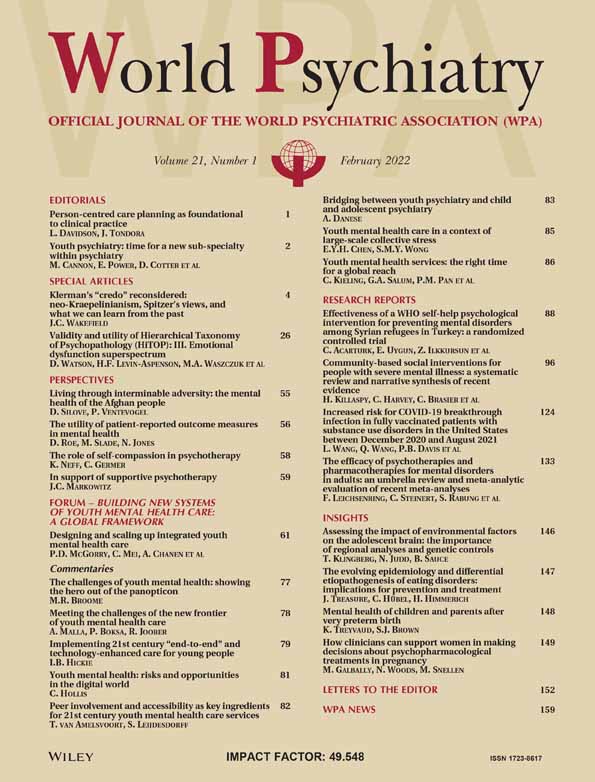Distinct cognitive trajectories in the early course of psychosis are associated with clinical and functional outcomes longitudinally.
IF 73.3
1区 医学
Q1 Medicine
引用次数: 0
Abstract
Cognitive dysfunction is a core dimension in psychotic disorders and among the strongest predictors of disability and poor quality of life. Cognitive impairments are highly heterogeneous, and cross-sectional studies have consistently found evidence of distinct cognitive profiles both within diagnoses and transdiagnostically. Findings regarding the course of cognitive impairments over time have been mixed. We hypothesized that subgroups of patients in the early course of psychosis show distinct cognitive trajectories that can be identified using data-driven methods, and that these subgroups differ on clinical and functional outcomes over time. Persons with schizophrenia-spectrum disorders or mood disorders with psychosis in the early course of illness (N=127) were assessed using clinical, functional and cognitive measures at three timepoints: baseline, 8 and 16 months. Group-based trajectory modeling was used to identify cognitive subgroups, which were then compared on clinical and functional measures using multilevel models. We identified three distinct cognitive subgroups: an Impaired group, an Average group, and a High-Functioning group. Cognition was stable over the follow-up period in the Impaired and High-Functioning groups, whereas the Average group showed cognitive improvement. Groups did not differ in terms of diagnostic distribution, baseline clinical symptoms, and most baseline functional and demographic measures. However, over the follow-up, group membership predicted changes in negative symptoms, social functioning, and patient-reported outcomes, with the Impaired group showing the most severe illness course. We conclude that patients in the early course of psychosis show distinct cognitive trajectories that predict future symptoms and social functioning, despite presenting no clinical differences at baseline. These findings have implications for understanding biology-cognition associations, which may be related to heterogeneity; developing predictive models for clinical and functional outcomes; and personalizing treatment to support patients' cognitive, clinical and functional needs towards improving illness course.精神病早期病程中不同的认知轨迹与临床和功能结果纵向相关。
认知功能障碍是精神障碍的一个核心维度,也是残疾和生活质量差的最强预测因素之一。认知障碍是高度异质性的,横断面研究一致发现在诊断和再诊断中都有不同的认知概况的证据。随着时间的推移,关于认知障碍病程的研究结果是混杂的。我们假设精神病早期患者的亚组表现出不同的认知轨迹,可以使用数据驱动的方法来识别,并且这些亚组随着时间的推移在临床和功能结果上存在差异。在病程早期患有精神分裂症谱系障碍或心境障碍的精神病患者(N=127)在三个时间点(基线、8个月和16个月)使用临床、功能和认知测量进行评估。基于组的轨迹模型用于识别认知亚组,然后使用多层模型对临床和功能测量进行比较。我们确定了三个不同的认知亚组:受损组,平均组和高功能组。在随访期间,受损组和高功能组的认知能力稳定,而平均组的认知能力则有所改善。各组在诊断分布、基线临床症状和大多数基线功能和人口统计指标方面没有差异。然而,在随访过程中,小组成员预测了阴性症状、社会功能和患者报告结果的变化,受损组显示出最严重的病程。我们的结论是,早期精神病患者表现出明显的认知轨迹,可以预测未来的症状和社会功能,尽管在基线时没有临床差异。这些发现对理解生物学-认知关联具有启示意义,这可能与异质性有关;开发临床和功能结果的预测模型;个性化治疗,支持患者的认知、临床和功能需求,以改善病程。
本文章由计算机程序翻译,如有差异,请以英文原文为准。
求助全文
约1分钟内获得全文
求助全文
来源期刊

World Psychiatry
Nursing-Psychiatric Mental Health
CiteScore
64.10
自引率
7.40%
发文量
124
期刊介绍:
World Psychiatry is the official journal of the World Psychiatric Association. It aims to disseminate information on significant clinical, service, and research developments in the mental health field.
World Psychiatry is published three times per year and is sent free of charge to psychiatrists.The recipient psychiatrists' names and addresses are provided by WPA member societies and sections.The language used in the journal is designed to be understandable by the majority of mental health professionals worldwide.
 求助内容:
求助内容: 应助结果提醒方式:
应助结果提醒方式:


